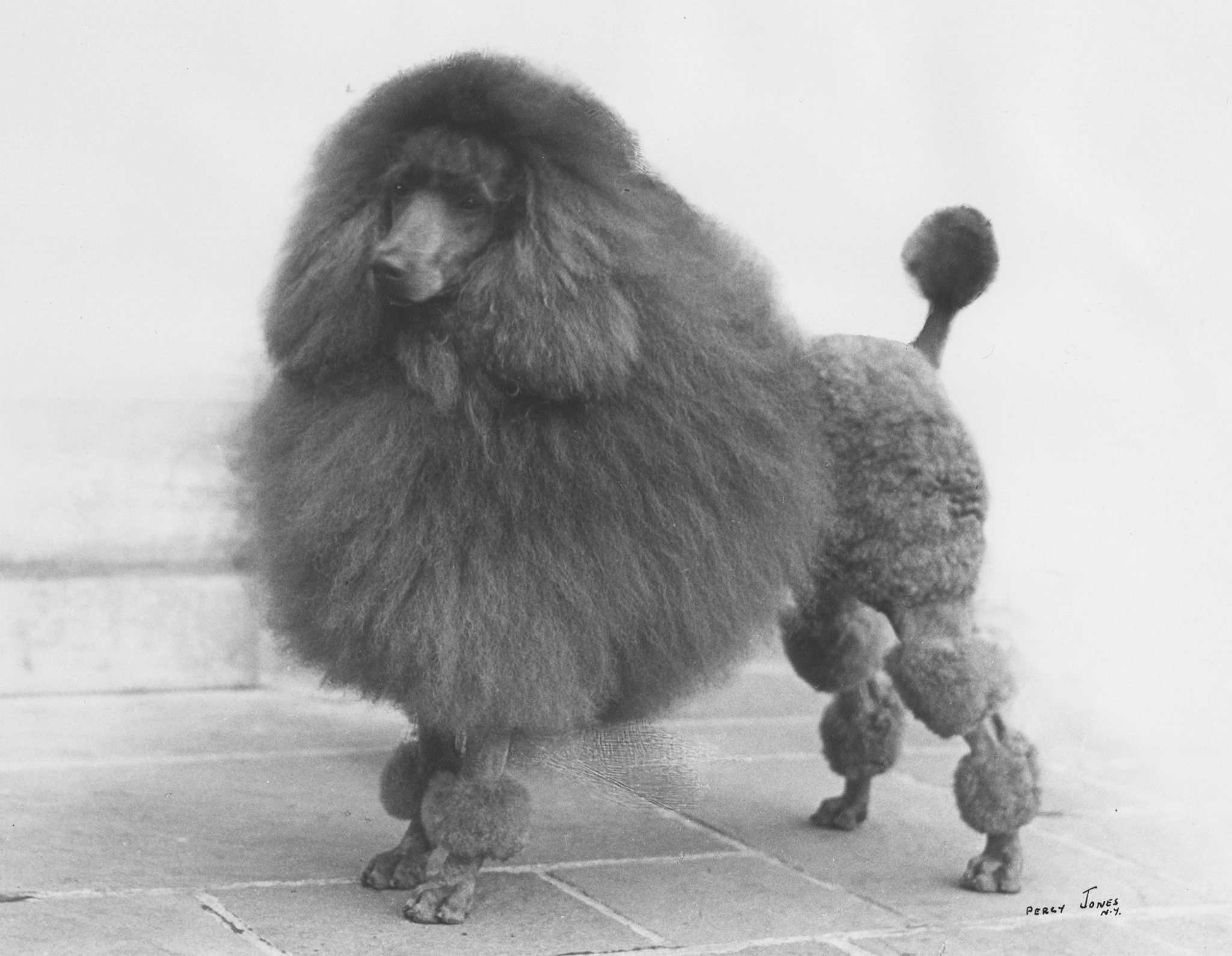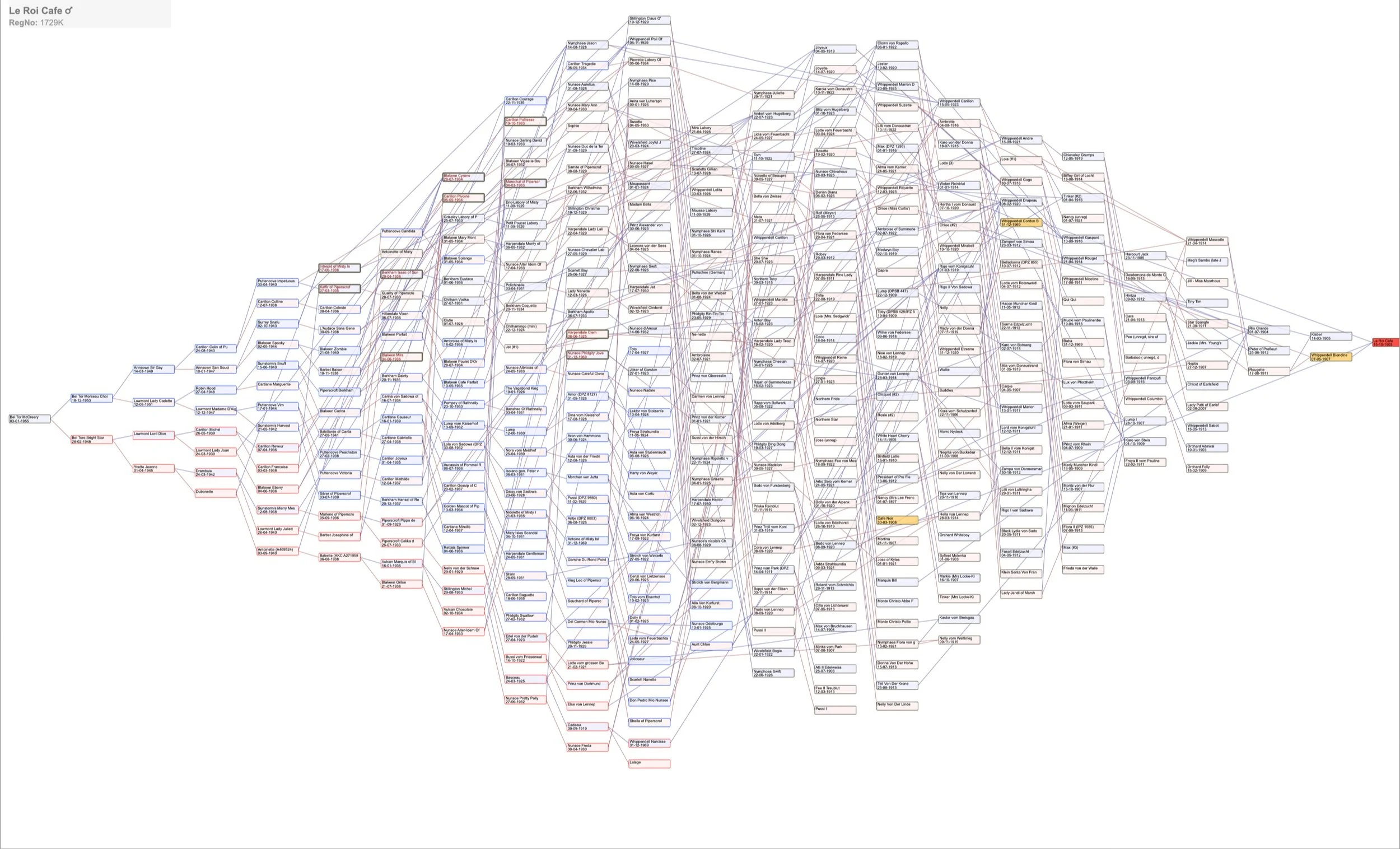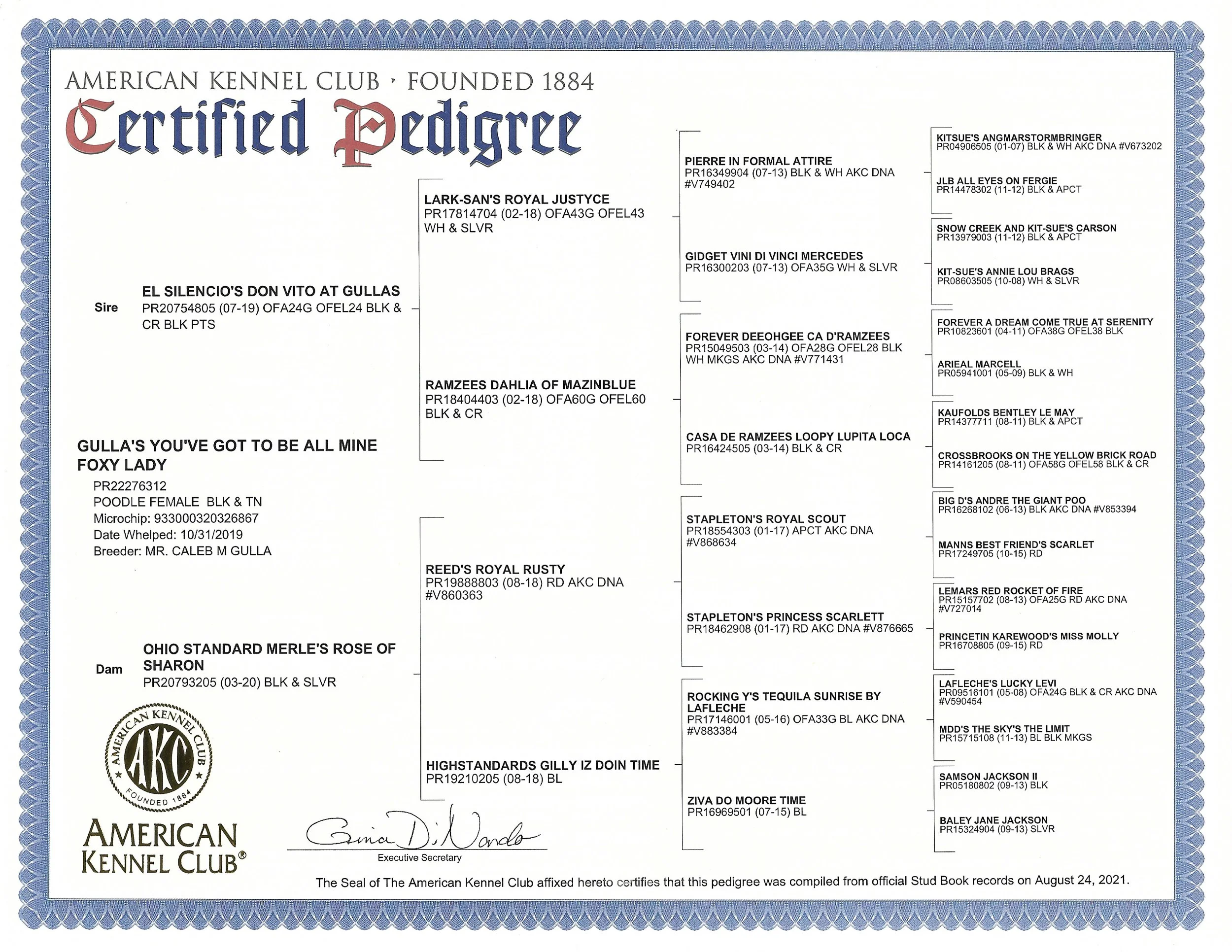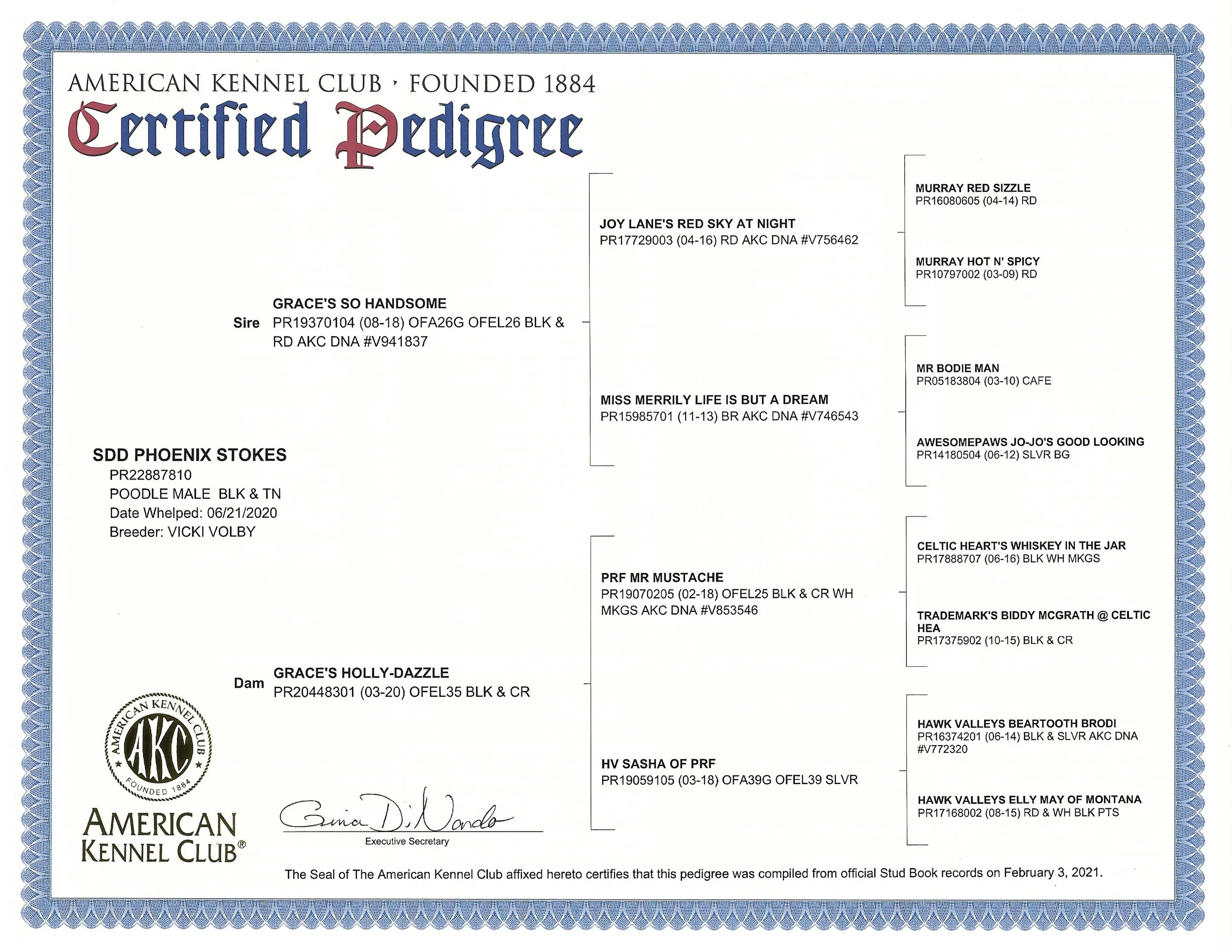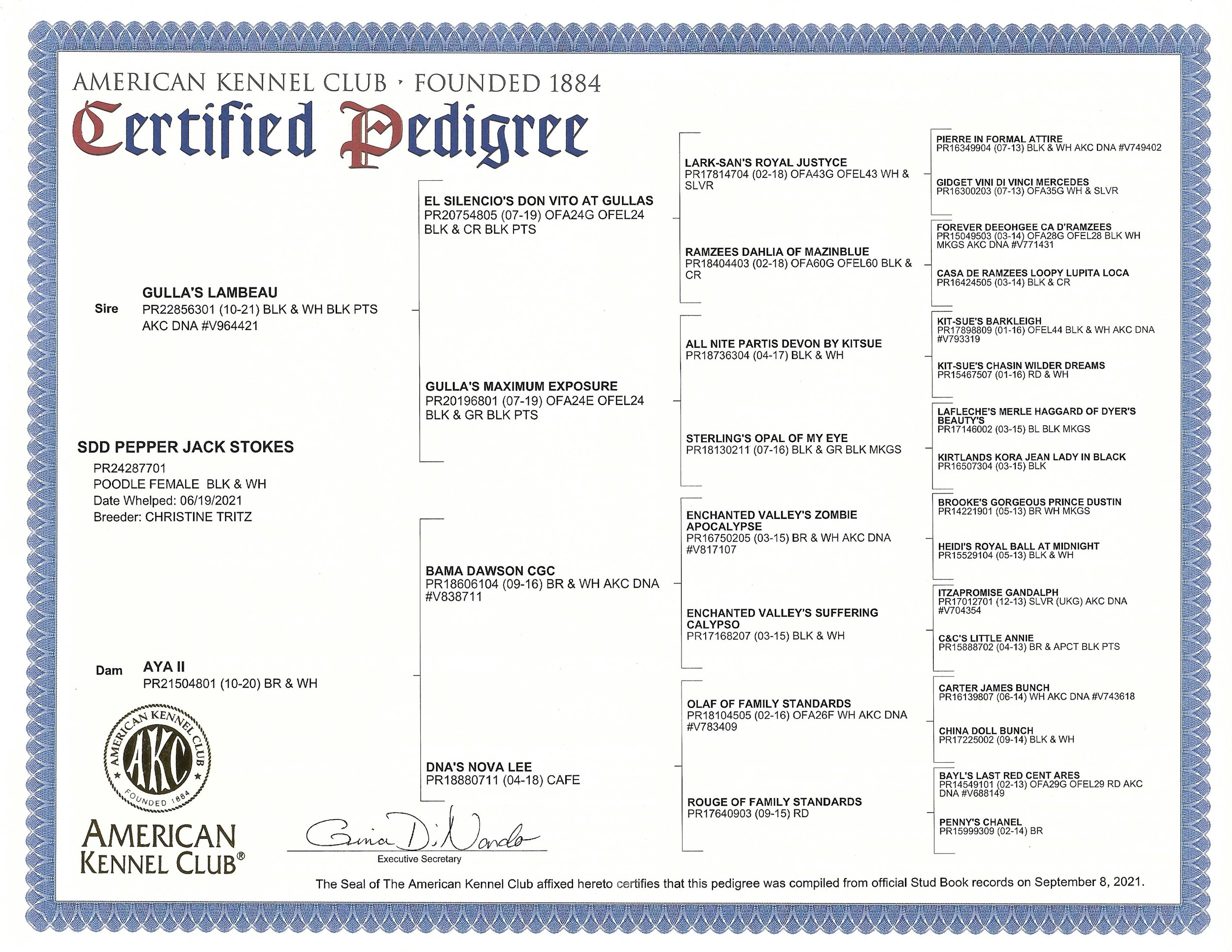Poodle History: The Legacy of the Poodles in America
AMCH Blakeen Cyrano TP © Percy Jones
The Legacy Behind Stokeshire Designer Doodles
At Stokeshire Designer Doodles, our mission is built on respect for history, commitment to ethical breeding, and a deep love for the remarkable dogs entrusted to us. Our work today is the continuation of a long and influential breeding legacy—one shaped by historic kennels, visionary breeders, and foundational bloodlines that helped establish the Standard Poodle in North America.
Honoring the Bloodlines That Built the Breed
The story of our lineage begins long before the rise of “doodles.” It traces back to the foundation of the Standard Poodle in North America, a history shaped by influential breeders like:
Jean Lyle – Wycliffe Kennel (North Vancouver, BC)
Sylvia Dempster – Petitcote Kennel (Quebec)
Ruth Krauss – Carillon Kennel
William R. Hopkins – Salmagundi Kennel
Mrs. Sherman Hoyt (Charlotte Hayes Blake Hoyt) – Blakeen Kennel
A pioneering woman whose contributions to the modern American Poodle are often overlooked or misreported. Her Blakeen bloodlines remain some of the most influential in breed history.
These breeders not only refined the breed phenotype but also protected its health, structure, elegance, and intelligence. Their kennels formed the genetic backbone of today’s Standard Poodles, and by extension, much of today’s doodle heritage.
The Wycliffe Influence – Precision Through Thoughtful Linebreeding
Our program at Stokeshire is especially inspired by Jean Lyle of Wycliffe Kennel, a determined breeder who began in the 1940s showing Boxers before shifting her focus entirely to Standard Poodles. Known for her meticulous approach and dedication to consistency, Lyle produced the famous Wycliffe central line, mainly focused on black Standard Poodles with striking type and balance.
Wycliffe’s pivotal turning point came in 1959, when Wycliffe Jacqueline was bred to Annsown Gay Knight of Arhill, producing an astonishing litter of six champions. This breeding solidified the line and influenced Poodle type for decades to come.
Lyle used structured linebreeding and, at times, father-daughter and mother-son crosses—not recklessly, but with the goal of locking in superior traits while preserving health and structure. These practices were groundbreaking for their time and demonstrated both the importance and responsibility of genetic selection.
Blakeen – The Influence of Hayes Blake Hoyt
No history of American Poodles would be complete without recognizing Charlotte Hayes Blake Hoyt, better known in her time as Mrs. Sherman Hoyt of Blakeen Kennel. A trailblazer for women in canine history, she rose to prominence as a breeder during a time when women were rarely credited. Her Blakeen Poodles helped establish the breed standard in the United States, influencing:
Structure and elegance
Sound movement
Functional beauty
Stable, trainable temperament
Her dedication to the breed was so impactful that many of the pedigrees behind Wycliffe, Carillon, Misty Isles, and Salmagundi trace back to Blakeen imports and bloodlines.
Importers and Kennel Collaboration – Building North American Foundations
Many influential dogs were imported from Europe during the 1930s–1950s to improve bloodlines in North America. In pedigree records, imported dogs are often indicated in red, as they were essential in diversifying the genetic pool, while domestically bred dogs appear in pale blue. Collaboration between kennels—through shared breedings, knowledge exchange, and mentorship—built what we now know as the American Standard Poodle.
The pedigrees behind today’s programs are not accidents—they are the result of decades of intentional selection by passionate breeders who valued structure, intelligence, and ethical development of the breed.
Continuing the Legacy at Stokeshire
Today, we carry this legacy forward through our Moyen Poodle sire, Phoenix, whose lineage traces back to these foundational bloodlines. Just as the great breeders before us pursued consistency, health, and temperament, we uphold those same principles as we thoughtfully expand into the world of Designer Doodles.
Our Australian Mountain Doodles (AMD), Golden Mountain Doodles (GMD), and Bernedoodles are not bred by chance—they are purposefully developed using strong Poodle genetics to preserve:
Proven temperament
Structural soundness
Long-term genetic health
Predictability and breed integrity
We honor tradition while embracing responsible innovation. Just as earlier kennels shaped the Standard Poodle, we are shaping future generations of healthier, more emotionally intelligent family companions.
Annsown Sir Gay, Wycliffe, and the Bloodlines Behind Stokeshire
In the world of designer doodles and exquisite Poodle mixes at Stokeshire Designer Doodles, we honor the rich history—and the influential figures—that shaped the modern American Standard Poodle. Among these figures, one stands out prominently: Annsown Sir Gay. His story threads through the 1930s–1960s, when kennels like Blakeen and Carillon were importing Standard Poodles in multiple colors and from varied origins, notably the elegant English and Swiss-German lines.
Diagram of a Poodle Pedigree - Understanding Purebred Dogs
Standout sires and the “snowball” effect
Every generation in Poodles produces a few standout sires—the males breeders and enthusiasts rally around for their unique combination of quality and type. Popular sires tend to be heavily used, and as their get and grand-get win, demand accelerates. This cyclical momentum creates a snowball effect, where one generation’s stars seed the next generation’s depth.
Annsown Sir Gay (b. 1949, Connecticut)
Annsown Sir Gay, whelped in Connecticut in 1949, was one such sire. Though he held no obedience titles and lived a relatively short life, his impact on the Standard Poodle is undeniable. Whether you attribute his influence to pure quality or the fortune of opportunity, Sir Gay became a pivotal conduit of breed progress.
He began in a small kennel but had the pedigree to turn heads—a son of a well-known Carillon stud with proximity to renowned programs. Early, influential use by Bel Tor and Carillon amplified his reach. In total, Sir Gay sired 21 litters and produced 21 AKC champions. Fascinatingly, only four of his sons became top producers—an illustration of how male-line leverage (a single sire can produce far more offspring than a dam) shapes a breed.
Among his notable sons:
Annsown Gay Knight of Arhill (Gay Knight) – the most enduring legacy
Morceau Choisi (Bel Tor)
Gigadibs (Bel Tor; breeder Rebecca Mason)
Carillon Dilemma (Carillon)
Each contributed champions and helped color the vibrant Standard Poodle history of mid-century America.
The Wycliffe “T” litter and a turning point (1959)
The success of Annsown Gay Knight connects directly to a crucial recommendation: Blanche Saunders (Carillon) urged Jean Lyle (Wycliffe) to use Gay Knight on Wycliffe Jacqueline, a proven dam who had already produced seven champions from two litters. The result was historic: in 1959, Jacqueline and Gay Knight produced five champion offspring, the famous Wycliffe “T” litter, a breeding that reset expectations for type and consistency.
Genetically, this moment had consequences. It’s estimated that the relative contribution of Gay Knight and Jacqueline to the current black Standard Poodle makes up ~55% of the total—a striking concentration that represents an “artificial” bottleneck. While not inherently harmful, such concentration does reduce genetic diversity, and responsible breeders must be mindful of founder effects.
Diversity matters: origins across Europe
Fortunately, modern Standard Poodles in North America draw from diverse origins—Belgian, English, French, German, and Swiss lines—mitigating some risks. While bottlenecks have occurred in many breeds, the Standard Poodle has generally enjoyed a relatively diverse genetic heritage, particularly when compared with narrower gene pools elsewhere.
“%Wycliffe” explained: decoding ancestry
In Standard Poodle discussions, “%Wycliffe” denotes the relationship coefficient (often referred to as “% blood”) of the primary Wycliffe line, calculated from five founding ancestors:
Carillon Michelle
Peticote (Petitcote) Domino
Annsown Gay Knight of Arhill
Carillon Dilemma
Sedbergh Mitzi
Because these dogs are from the 1950s, enough generations must be included to compute meaningful values. As outlined in Dr. Armstrong’s chart, a modern method was developed to calculate %Wycliffe efficiently for around 200,000 dogs in ~15 minutes, tracing from the five founders through their descendants. Following Malcolm Willis’s approach to relationship coefficients/% blood, a single appearance contributes based on depth in the pedigree, and multiple appearances are summed.
Sir Gay, Gay Knight, and later lines
Annsown Sir Gay and Annsown Gay Knight were hugely popular in the 1950s, overshadowing many contemporaries.
In the 1960s, Anderl von Hugelberg rose as a dominant line.
Reds and apricots lean on their own pillars—the “Old English Apricots.”
By analogy, some historians dub Sir Gay the “Noah” and Anderl the “Adam” for their broad, foundational influence.
Early 20th-century dogs contribute relatively little to the modern gene pool, given the strong mid-century consolidation.
Why doodles (done right) can support health
Dr. Armstrong’s work on canine population genetics underscores the importance of genetic diversity for adaptation and long-term health. Purebred breeding must constantly balance type and predictability with diversity. Thoughtful outcrossing—such as a Labrador Retriever × Poodle—can reintroduce variation, potentially lowering risks associated with restricted gene pools and founder effects.
When responsibly managed, doodle programs can:
Maintain breed identity where appropriate while re-balancing diversity
Use pedigree databases and health data to make informed pairings
Redistribute genetic diversity to bolster longevity and resilience
At Stokeshire, this is our compass: health, structure, temperament, and diversity, in that order.
Blakeen Kennel and Hayes Blake Hoyt
The American Poodle story cannot be told without Blakeen Kennel and Charlotte Hayes Blake Hoyt (publicly known in her era as Mrs. Sherman Hoyt). A pioneering woman in a male-dominated field, she elevated the American Poodle through selective, thoughtful pairings that emphasized:
Superior structure and movement
Sound health and vitality
Elegant, consistent type
Intelligent, stable temperaments
Blakeen Poodles amassed championships and reshaped public perception—from ornamental companion to a true working and show dog of distinction. Many modern pedigrees still trace to Blakeen foundation stock. Beyond breeding, Hoyt mentored, wrote, and advocated for responsible practices, helping shape early American interpretations of breed standards. She remains a visionary whose influence guides ethical breeders today.
Other influential threads you mentioned
GER CH Karo von Botnang – A distinguished German Champion, celebrated for pedigree and conformation; a touchstone for breed excellence that continues to inspire.
“Kit Sue” Miniature Poodles (Sue Selle) – A defining American line in Miniatures, noted for quality, conformation, temperament, and show success—proof that certain kennel names become synonymous with excellence through decades of consistency.
Registration milestones in the UK and US
1874 – The Kennel Club (UK) registers its first Poodle, establishing formal recognition and a framework for collaboration and standardization.
1886 – The American Kennel Club registers its first Poodle, beginning a uniquely American trajectory that soon flourished in both the show ring and the home.
Progress in both countries was propelled by committed breeders and kennels. In the UK, programs like Fircot advanced Miniatures with color and type goals; in the US, Hayes Blake Hoyt (Blakeen) and imports such as Ch. Whippendell Poli of Carillon helped set the American benchmark.
Ch. Whippendell Poli of Carillon
Ch. Whippendell Poli of Carillon (whelped 1930) emerged during a transformative era and quickly became an international standard-bearer:
First Poodle to win a Westminster group (1930), a signal moment that elevated the breed’s profile.
A transatlantic presence, Poli influenced both American and British rings, bridging styles and strengthening global appeal.
His head type, movement, and balance set a reference for conformation and temperament that inspired breeders for generations.
How this history shapes Stokeshire today
At Stokeshire Designer Doodles, we study and respect these lineages—not to live in the past, but to build wisely for the future. Our pairings are planned to preserve:
Proven temperament and intelligence
Structural soundness and athleticism
Long-term health via responsible testing and genetic diversity
The same disciplined thinking that produced the Wycliffe “T” litter guides our approach to Designer Doodles. By honoring Blakeen, Carillon, Wycliffe, Bel Tor, and others, we carry forward the best of the Standard Poodle while crafting healthy, emotionally intelligent family companions for the modern home.
In conclusion, a close look at the pedigrees behind Stokeshire Designer Doodles reveals an intricate, interconnected tapestry. Though our dogs descend from different breeders, their near-recent ancestors converge—evidence of the Poodle’s deep, shared history. Notably, both Foxy and Pepper trace back to UKC CH Ramzees Dahlia of Mazinblue, herself from a long line of champion white Poodles. This lineage underscores the continuity of excellence that underpins our program.
With that heritage in view, we approach breeding as both stewardship and innovation. We honor the past while forging thoughtful new paths in the world of designer doodles—pairings that respect type, temperament, and structure, while prioritizing health and genetic breadth. In doing so, we acknowledge the realities of founder effects and bottlenecks, and we use diversity-minded strategies to help counter them.
Doodles, with their purposeful infusion of complementary genetics, represent a practical response to those challenges. By emphasizing genetic diversity and overall well-being, ethical breeders and informed owners together advance a future that is brighter, healthier, and more adaptable for our companions. Doodles don’t replace Poodle heritage; they extend it—demonstrating the positive change possible when excellence and diversity work hand in hand.
At Stokeshire, we stand at that intersection—marrying the beauty of the past with the promise of the future. By preserving the Poodle’s mesmerizing history and embracing the unique advantages of doodles, we aim to make a lasting, constructive impact on modern dog breeding. With each generation, we push the boundaries of responsible excellence—so that our designer doodles leave a meaningful mark on the lives and hearts of all who meet them.
References
American Kennel Club. (n.d.). Breeder education. https://www.akc.org/breeder-programs/
American Kennel Club. (n.d.). Poodle (Standard) breed information. https://www.akc.org/dog-breeds/poodle-standard/
American Veterinary Medical Association. (n.d.). Genetic diversity in dogs. https://www.avma.org/resources/pet-owners/petcare/genetic-diversity-dogs
Armstrong, J. B. (2001, July 15). The complex world of canine genetics: Nurturing diversity in dog breeding (Original work published 1998). Canine Diversity Project. http://www.canine-genetics.com
Cornell University College of Veterinary Medicine. (n.d.). Canine genetics. https://www.vet.cornell.edu/departments-centers-and-institutes/cornell-ruffed-grouse-society/canine-genetics
Institute of Canine Biology. (n.d.). The Institute of Canine Biology. https://www.instituteofcaninebiology.org

